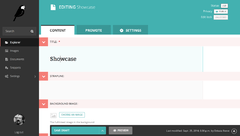wagtail (CMS)
|
Wagtail interface | |
| Developer(s) | Torchbox |
|---|---|
| Initial release | February 2014 |
| Stable release |
1.5.2
/ 8 June 2016[1] |
| Development status | Active |
| Written in | Python |
| Operating system | Cross-platform |
| Platform | Django |
| Available in | 10[2] languages |
| Type | Content management system |
| License | BSD licenses[3] |
| Website |
wagtail |
Wagtail is a free and open source[4] Content Management System (CMS) written in Python.[5][6] It is popular[7][8] amongst CMSes using the Django framework.[9] The project is maintained by a team of open-source contributors[10] backed by companies around the world.[11] The project has a focus on developer friendliness[12] as well as ease of use of its administration interface, translated in multiple languages.[13]
History
The Wagtail project was started in 2014[14] by Torchbox, a digital agency. The development of the CMS evolved from being the sole action of its creators[15] to receiving contributions from 46 external contributors by its version 1.0[16] in July 2015. Since then, development sprints have been organised[17] to foster the community. During those sprints, contributors gather to work on selected topics and steer the project. As of July 2016, 257 people have directly contributed to the code and translations.[18]
Notable uses
- NASA for the openNasaOpen Data portal
- The 18F agency of the US Government for beta.FEC.gov[19]
- Peace Corps on their site[20]
- New Zealand Red Cross on their site[21]
- University of Pennsylvania for the Wharton Tech Blog[22]
- University of Duhok for their site[23]
- University of Tasmania for multiple sites[24][25][26]
References
- ↑ "Wagtail CHANGELOG". github.com. 24 November 2015. Retrieved 11 December 2015.
- ↑ "torchbox/wagtail on Transifex". Transifex. Retrieved July 22, 2016.
- ↑ "torchbox/wagtail license on GitHub". GitHub.com. Retrieved July 22, 2016.
- ↑ "torchbox/wagtail license on GitHub". GitHub. Retrieved 2016-07-09.
- ↑ "wagtail: Python Package Index". pypi.python.org. Retrieved 2016-07-09.
- ↑ "Django Content Management System - Wagtail CMS". wagtail.io. Retrieved 2016-03-01.
- ↑ "vinta/awesome-python". GitHub. Retrieved 2016-07-09.
- ↑ "torchbox/wagtail stargazers". GitHub. Retrieved 2016-07-09.
- ↑ "Django Packages - CMS". djangopackages.com. Retrieved 2016-03-01.
- ↑ "torchbox/wagtail contributors on GitHub". GitHub. Retrieved 2016-07-09.
- ↑ "Developers". madewithwagtail.org. Retrieved 2016-07-09.
- ↑ "About Wagtail CMS | Wagtail CMS". Wagtail CMS. Retrieved 2016-07-09.
- ↑ "The Wagtail translation project on Transifex". www.transifex.com. Retrieved 2016-07-09.
- ↑ "First commit to torchbox/wagtail". GitHub. Retrieved 2016-07-09.
- ↑ "torchbox/wagtail contributors list in v0.1". GitHub. Retrieved 2016-07-09.
- ↑ "torchbox/wagtail list of contributors for v1.0 on GitHub". GitHub. Retrieved 2016-07-09.
- ↑ "springload/wagtail-core-notes for the june 2016 sprint". GitHub. Retrieved 2016-07-09.
- ↑ "torchbox/wagtail contributors list". GitHub. Retrieved 2016-07-09.
- ↑ "18F/fec-cms". GitHub. Retrieved 2016-07-18.
- ↑ "Peace Corps". www.peacecorps.gov. Retrieved 2016-08-03.
- ↑ "New Zealand Red Cross". www.redcross.org.nz. Retrieved 2016-07-09.
- ↑ "The UK firm behind this buzzy Wordpress competitor is opening an office in Philly - Technical.ly Philly". 2015-11-11. Retrieved 2016-07-18.
- ↑ "University of Duhok (UoD)". web.uod.ac. Retrieved 2016-07-09.
- ↑ "University of Tasmania, Australia". www.utas.edu.au. Retrieved 2016-07-09.
- ↑ "Research to Reality | The University of Tasmania". The University of Tasmania. Retrieved 2016-07-09.
- ↑ "125 Timeline - University of Tasmania". 125timeline.utas.edu.au. Retrieved 2016-07-09.
